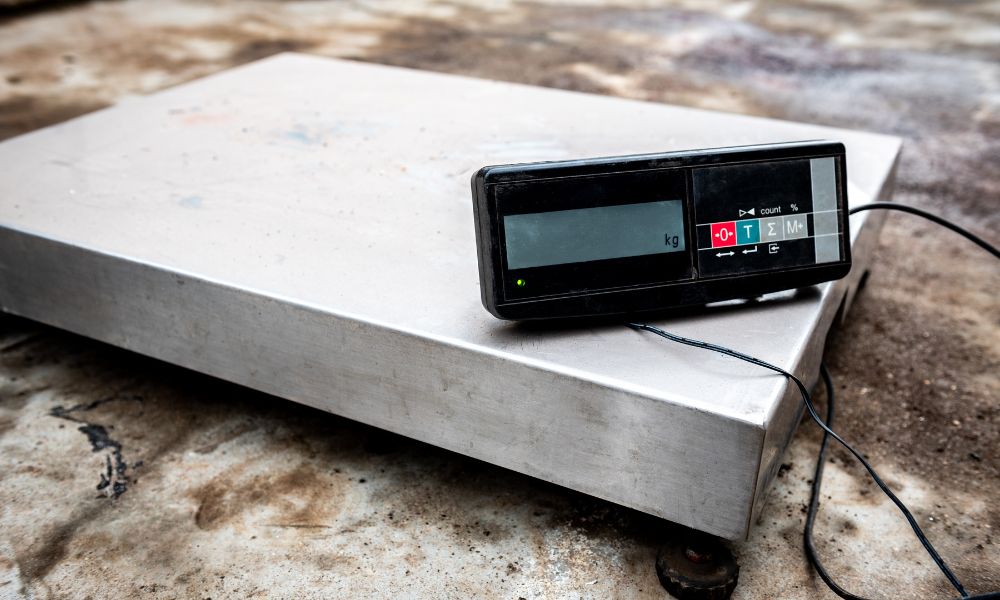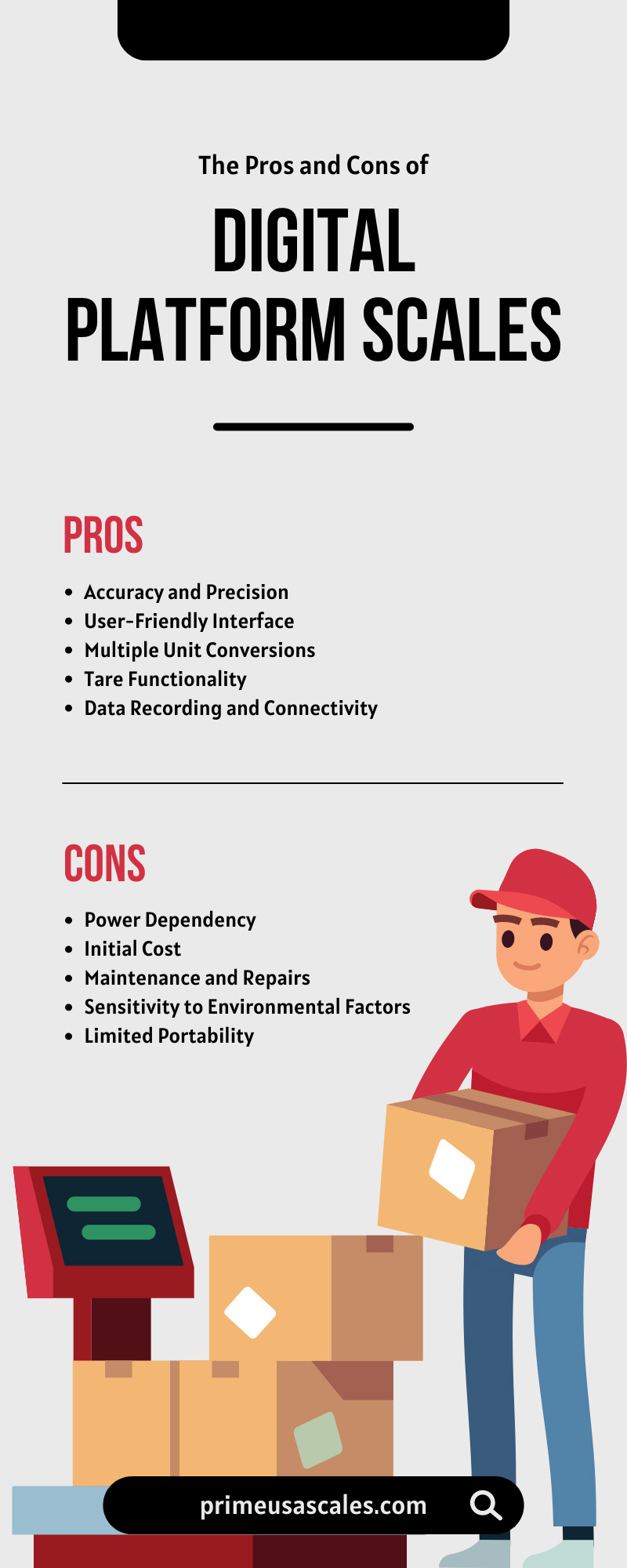
Digital platform scales are a revolutionary tool, transforming how you can measure and weigh objects. These advanced scales use cutting-edge digital technology to offer precise and efficient readings, leaving traditional analog scales behind.
For your business to thrive and stay competitive in a crowded market, you must have the necessary equipment to provide accurate and fast results. Digital platform scales offer multiple benefits, but these devices also come with a higher price that you must consider as an investment to reach your goals.
Ultimately, to truly enjoy the benefits and new business options that digital platform scales can offer, you should carefully weigh the pros and cons before deciding. Learning as much as possible about the product will help you make an informed decision, aligning your purchase with your goals.
Pros of Digital Platform Scales
Most machines with upgrades and innovative features will offer a business quicker solutions to common problems, minimizing human involvement and errors. Below are some of the ways that digital platform scales prove their helpfulness and efficiency.
Accuracy and Precision
A platform scale with digital features offers unmatched accuracy and precision for more reliable results. Unlike their analog counterparts, which often suffer from inconsistent readings due to mechanical wear and tear, digital scales rely on electronic sensors and load cells that provide precise measurements. This exceptional accuracy is invaluable in various industries—such as pharmaceuticals, laboratories, and manufacturing—where accurate weighing is critical for quality control.
User-Friendly Interface
Digital platform scales mainly focus on user convenience to minimize confusion and provide better solutions. With clear LCD displays, intuitive buttons, and straightforward calibration procedures, these scales are user friendly, even for those with minimal technical knowledge. This characteristic reduces the risk of errors, making these devices ideal for the demands of professional use.
Multiple Unit Conversions
The ability to switch between different units of measurement is another great advantage of digital platform scales. They offer the flexibility to display weights in various formats, including kilograms, pounds, ounces, grams, and more. This versatility simplifies tasks, especially if your business operates in international markets with diverse weighing standards to accommodate and cater to everyone.
Tare Functionality
The tare function is a unique feature in digital platform scales that simplifies measuring smaller or volatile items that must remain inside a container. The tare function allows you to reset the scale to zero after placing a container on it, enabling you to measure only the contents’ weight. This feature is necessary to remove unwanted weights, especially if these extra numbers could financially affect the results.
Data Recording and Connectivity
Digital platform scales often come equipped with data recording capabilities and connectivity options, allowing you to store weighing results for future analysis. Many models can connect to computers or other devices through USB or Bluetooth, facilitating data transfer and integration into management systems. This feature improves workflows, enhances productivity, and ensures a seamless data flow in commercial settings.
Cons of Digital Platform Scales
Technology and innovation provide multiple benefits for different businesses and scenarios, but these changes often come with more details to consider that might not be as positive. Learning about the cons of digital platform scales will give you a broader view and the knowledge to make a fully informed decision. Below are the main cons to consider.
Power Dependency
Unlike traditional analog scales that require no power source, digital platform scales rely on electricity to operate. This dependency on power makes them vulnerable to interruptions in the event of power outages or drained batteries. While some models incorporate rechargeable batteries, there is always a risk of the scale becoming nonfunctional if you don’t charge or maintain it adequately.
Initial Cost
Digital platform scales, with their advanced technology and features, often carry a higher initial cost compared with analog scales. This expense factor could cause some businesses and individuals to reconsider investing in these scales, especially if their weighing needs are minimal.
However, you must also think about the long-term benefits and potential cost savings from increased accuracy and productivity. This is especially important to consider if your business can quickly recover the cost of a digital platform scale in profit once it gets the additional help these scales provide.
Maintenance and Repairs
While digital platform scales are generally more durable than analogs, they are not immune to malfunctions and damage. Just like other specialized machines, digital scales require regular maintenance to stay functional and in optimal condition, considerably expanding their lifespan. In case of technical issues, repairs may entail specialized expertise, parts, and tools, adding to the overall cost of ownership.
Sensitivity to Environmental Factors
Digital platform scales can be sensitive to environmental factors like temperature, humidity, irregular surfaces, and vibrations. Extreme conditions can influence the accuracy of readings, leading to potential inconsistencies. Therefore, you must place these scales in a controlled environment to prevent problems that may go unnoticed and ensure consistent, reliable results.
Limited Portability
Finally, digital platform scales, particularly larger ones designed for industrial applications, can be bulkier and less portable than analog ones. This lack of portability might be a deal-breaker for businesses or individuals who need a scale they can move easily from one location to another. You can choose from different digital scale models depending on your business needs, but all these types of scales generally have more movement restrictions than their analog counterparts.
Digital platform scales have greatly revolutionized the weighing industry, offering accuracy, user-friendly interfaces, and data connectivity. Despite their numerous benefits, they also have important drawbacks, including power dependency, initial cost, and sensitivity to environmental factors. When considering investing in a digital platform scale, evaluate individual business needs and weigh frequency and budget constraints to make an informed decision.
The pros and cons of digital platform scales are important, but the pros will have a greater impact, especially if you seek precision, efficiency, and data-management capabilities. Embracing these modern weighing solutions can improve productivity, quality control, and processes across various industries, promoting a new era of efficient weighing technology.
With the help of professionals, you can make the best decision for your business to create an environment of growth and keep your clients happy with accuracy. Call Prime USA Scales today to find the best weighing solution to enhance your business operations and get results that will make you stand out from the competition.
